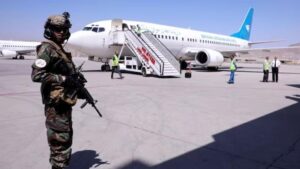Afghanistan: Taliban Takeover Worsens Rights Crisis

Afghanistan: Taliban Takeover Worsens Rights Crisis
The takeover of the Afghan Taliban accelerate the crisis of human rights and humanitarian disasters, said Human Rights Watch today in the world report 2022.
After the Taliban controlled the state on August 15, 2021, they rolled back the progress of women’s rights and media freedom – the most important achievement of post-2001 reconstruction efforts. Many secondary schools for girls remain closed at the end of the year, and women are mostly prohibited from working in jobs outside of health care and care.
“Afghanistan was arrested among Taliban suppression and starvation specter,” said Patricia Gossman, Asian Associate Director at Human Rights Watch. “The government involved in Afghanistan over the past two decades must provide humanitarian assistance and fund basic services, including health and education, while using their leverage to suppress to end the violations of Taliban rights.”
In World Report 752 Page 2022, the 32nd edition, Human Rights Watch reviewed human rights practices in nearly 100 countries. Executive Director Kenneth Roth challenges conventional wisdom that autocracy increases. In the country after the country, a large number of people have recently been taken to the streets, even with the risk of being arrested or shot, indicating that the appeal of democracy remains strong. Meanwhile, autocrats feel more difficult to manipulate the election in supporting them. Still, he said, democratic leaders must do a better job to meet national and global challenges and ensure that democracy provides promised dividends.
Evacuation was chaotic thousands of Afghans left many people who remained at risk of retaliation of Taliban. Taliban forces will carry out many former members of the Afghan government security forces. Freeze on the Afghan currency reserve and loss of foreign aid accelerate the economic collapse, leaving millions of Afghans at risk of hunger. The collapse of state health services means that many Afghans face the loss of most physical and mental health care.
Within a few weeks after the Taliban takeover, the new government announced the flow of stable policies and regulations that overthrew women’s rights. The Taliban authorities also impose extensive restrictions on Afghan media, and along with flight many journalists abroad, almost 70 percent of Afghan media outlets are closed. Both the Taliban and Islamic State of the Province of Khorasan (ISUKP), Afghanistan branches from the Islamic State (ISIS), conducted targeted civilian murder including government employees, journalists, and religious leaders.
The number of civilians killed and injured in the conflict surged in the first six months of 2021 from the attack by the Taliban and Afghan government security forces, the latter mainly from air strikes. The ISUP conducted many attacks on civil facilities, including schools and mosques, killing hundreds, most of them members of the Hazara Afghanistan community. The ISUKP attack continues after the Taliban takeover.
The prosecutor of the International Criminal Court was looking for authorization to continue his investigation but stated that he would focus on alleged crimes by the Taliban and ISUKP, and reduced three US military workers and former Afghan government security forces.





